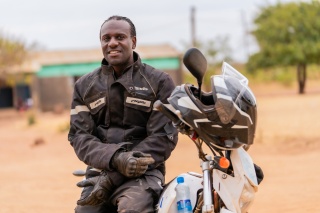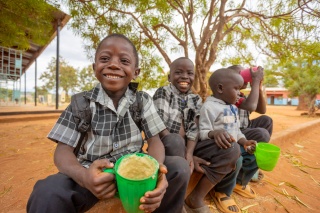
“It’s more than porridge – it’s a lifeline”
Life as a school feeding officer in Zambia
Amos Lungu has been a dedicated member of the Mary’s Meals Zambia team since 2016. As a school feeding officer, he covers nearly 12,000 kilometres every year visiting all the schools under his watch on rotation – ensuring that children living in even the most remote areas receive food.
From meticulous planning to navigating unpredictable conditions, Amos plays a crucial role in keeping children nourished and thriving in school.
He says: “The porridge that we serve in school is beyond just a meal. We are saving learners’ lives who solely rely on this porridge for survival. In certain homes, there is real hunger, and for these children, the porridge at school is saving them from starvation.
“Some hang around schools, hoping that maybe they can be given an extra cup later on. Some are forced to go in the bush after school to hunt for mice to eat for dinner.
“The porridge has helped to reduce hunger, and children are having a beautiful experience at school.”
Reaching the next hungry child

Amos has witnessed the growth of Mary’s Meals Zambia first-hand – from serving approximately 42,000 children in 64 schools when he began his role in 2016, to reaching more than 400,000 children today in more than 1,000 schools in the country’s Eastern Province.
Working with Mary’s Meals has helped Amos to understand the many challenges children face, and the hurdles communities encounter as they try to help their children attend school.
He says: “As I interact with villagers and teachers, I understand that there is space for improvement to help these communities better their lives. My work with Mary’s Meals is helping to address one of the greatest challenges – hunger. For many, the porridge could be the most expensive meal they have because of the ingredients and its nutritional value.
“Most children come to school without eating anything. They hope and trust that when they are in school, they are going to have porridge. I see others who are not enrolled and wait outside for them to just have a cup of porridge. They become encouraged to enrol and stay in class because of the porridge.”
Life on the road

Amos’ portfolio consists of 20 schools, and he visits them at least once per week. His typical day starts at 6am. He travels over 110 kilometres each day from Monday to Wednesday and spends Thursdays and Fridays inputting school feeding data.
He tells us: “In a year, I ride approximately 11,880 kilometres, excluding visits made during holidays. In my eight years of riding, the first few years were hard during the raining season because I would fall off the bike and all the documents would get soaked.”
Amos considers five of the schools in his care ‘hard to reach’. He tells us that a lot of work is required to forecast, plan and collaborate with the schools to ensure food is delivered before the school is cut off by the rain.
The importance of community

As a school feeding officer, Amos plays a key role in engaging local communities.
He says: “The community is one of the important partners in the feeding programme. They come to cook each and every day.
“The constant communication with the community has helped us to keep momentum going throughout the years. I hold regular community meeting with parents, traditional leaders, and school administrations to help share Mary’s Meals’ vision, and to collect vital feedback that has helped to grow and maintain the programme.”
The power of porridge

Like many Zambian families today, Amos is concerned with the challenges associated with an unstable environment, but he is glad that there are hundreds of thousands of children who have the option of eating Mary’s Meals at school. He fondly remembers that, when he was young, his mother would cook porridge with maize or millet for him and his siblings to kickstart their day.
He says: “Many Zambians like me have a good relationship with porridge. Today, I know that thousands of children are excited to be in school because of the porridge. When I visit schools, I can see how excited the children are to have it. They are able to happily share stories with their friends under the trees, each child with a warm cup of porridge in hand.”
Looking to the future
Married with three children of his own, Amos is also making time to pursue a bachelor’s degree in development studies with African University, a path he believes will expand his skills and bring new ideas that can help serve the delivery of our school feeding programme.
He tells us: “I feel privileged to be part of the Mary’s Meals journey, which helps to save thousands of children from hunger by providing them with a meal in a place of education”.


